#toni tipton Martin
Explore tagged Tumblr posts
Text
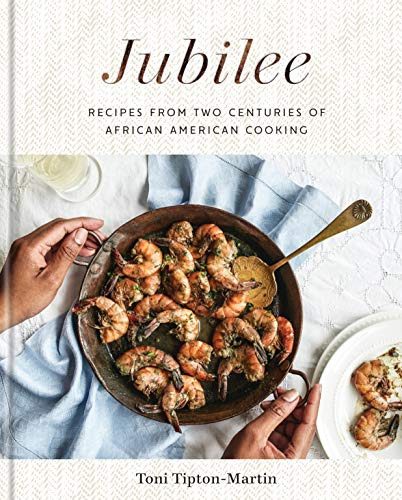
Click to download this book for free on Z-Lib
Adapted from historical texts and rare African-American cookbooks, the 125 recipes of Jubilee paint a rich, varied picture of the true history of African-American cooking: a cuisine far beyond soul food. Toni Tipton-Martin, the first African-American food editor of a daily American newspaper, is the author of the James Beard Award-winning The Jemima Code, a history of African-American cooking found in-and between-the lines of three centuries' worth of African-American cookbooks.
Tipton-Martin builds on that research in Jubilee, adapting recipes from those historic texts for the modern kitchen. What we find is a world of African-American cuisine-made by enslaved master chefs, free caterers, and black entrepreneurs and culinary stars-that goes far beyond soul food. It's a cuisine that was developed in the homes of the elite and middle class; that takes inspiration from around the globe; that is a diverse, varied style of cooking that has created much of what we know of as American cuisine.
“A celebration of African American cuisine right now, in all of its abundance and variety.”—Tejal Rao, The New York Times JAMES BEARD AWARD WINNER • IACP AWARD WINNER • IACP BOOK OF THE YEAR • TONI TIPTON-MARTIN NAMED THE 2021 JULIA CHILD AWARD RECIPIENT NAMED ONE OF THE BEST COOKBOOKS OF THE YEAR BY The New York Times Book Review • The New Yorker • NPR • Chicago Tribune • The Atlantic • BuzzFeed • Food52 Throughout her career, Toni Tipton-Martin has shed new light on the history, breadth, and depth of African American cuisine. She’s introduced us to black cooks, some long forgotten, who established much of what’s considered to be our national cuisine. After all, if Thomas Jefferson introduced French haute cuisine to this country, who do you think actually cooked it? In Jubilee, Tipton-Martin brings these masters into our kitchens. Through recipes and stories, we cook along with these pioneering figures, from enslaved chefs to middle- and upper-class writers and entrepreneurs. With more than 100 recipes, from classics such as Sweet Potato Biscuits, Seafood Gumbo, Buttermilk Fried Chicken, and Pecan Pie with Bourbon to lesser-known but even more decadent dishes like Bourbon & Apple Hot Toddies, Spoon Bread, and Baked Ham Glazed with Champagne, Jubilee presents techniques, ingredients, and dishes that show the roots of African American cooking—deeply beautiful, culturally diverse, fit for celebration. Praise for Jubilee “There are precious few feelings as nice as one that comes from falling in love with a cookbook. . . . New techniques, new flavors, new narratives—everything so thrilling you want to make the recipes over and over again . . . this has been my experience with Toni Tipton-Martin’s Jubilee.”—Sam Sifton, The New York Times “Despite their deep roots, the recipes—even the oldest ones—feel fresh and modern, a testament to the essentiality of African-American gastronomy to all of American cuisine.”—The New Yorker “Jubilee is part-essential history lesson, part-brilliantly researched culinary artifact, and wholly functional, not to mention deeply delicious.”—Kitchn “Tipton-Martin has given us the gift of a clear view of the generosity of the black hands that have flavored and shaped American cuisine for over two centuries.”—Taste
#Jubilee#african american cookbooks#African American Cooking#toni tipton Martin#American Cuisine#African American Cuisine#homegrown recipes#roots of African American Gastronomy
10 notes
·
View notes
Text
Jubilee: Recipes from Two Centuries of African American Cooking: A Cookbook
Click the Title for a Free Download from THE BLACK TRUEBRARY

Jubilee: Recipes from Two Centuries of African American Cooking: A Cookbook
Click the Title for a Free Download from THE BLACK TRUEBRARY
Throughout her career, Toni Tipton-Martin has shed new light on the history, breadth, and depth of African American cuisine. She’s introduced us to black cooks, some long forgotten, who established much of what’s considered to be our national cuisine. After all, if Thomas Jefferson introduced French haute cuisine to this country, who do you think actually cooked it? In Jubilee, Tipton-Martin brings these masters into our kitchens. Through recipes and stories, we cook along with these pioneering figures, from enslaved chefs to middle- and upper-class writers and entrepreneurs.
With more than 100 recipes, from classics such as Sweet Potato Biscuits, Seafood Gumbo, Buttermilk Fried Chicken, and Pecan Pie with Bourbon to lesser-known but even more decadent dishes like Bourbon & Apple Hot Toddies, Spoon Bread, and Baked Ham Glazed with Champagne, Jubilee presents techniques, ingredients, and dishes that show the roots of African American cooking—deeply beautiful, culturally diverse, fit for celebration. Praise for Jubilee “There are precious few feelings as nice as one that comes from falling in love with a cookbook. . . . New techniques, new flavors, new narratives—everything so thrilling you want to make the recipes over and over again . . . this has been my experience with Toni Tipton-Martin’s Jubilee.”—Sam Sifton, The New York Times “Despite their deep roots, the recipes—even the oldest ones—feel fresh and modern, a testament to the essentiality of African-American gastronomy to all of American cuisine.”—The New Yorker “Jubilee is part-essential history lesson, part-brilliantly researched culinary artifact, and wholly functional, not to mention deeply delicious.”—Kitchn “Tipton-Martin has given us the gift of a clear view of the generosity of the black hands that have flavored and shaped American cuisine for over two centuries.”—Taste
“A celebration of African American cuisine right now, in all of its abundance and variety.”—Tejal Rao, The New York Times JAMES BEARD AWARD WINNER • IACP AWARD WINNER • IACP BOOK OF THE YEAR • TONI TIPTON-MARTIN NAMED THE 2021 JULIA CHILD AWARD RECIPIENT NAMED ONE OF THE BEST COOKBOOKS OF THE YEAR BY The New York Times Book Review • The New Yorker • NPR • Chicago Tribune • The Atlantic • BuzzFeed • Food52
Click the Title for a Free Download from THE BLACK TRUEBRARY
#Jubilee: Recipes from Two Centuries of African American Cooking: A Cookbook#African American#African American Cookbooks#Cooking#african american cooking#soul food
4 notes
·
View notes
Text
What could've been Animaze ..iNC during the 2010s
Talent pool (Note: any voice actor marked with * is union-only):
Steve Blum*
Mary Elizabeth McGlynn*
Crispin Freeman*
Kari Wahlgren*
Johnny Yong Bosch
Yuri Lowenthal*
Dave Wittenberg*
Roger Craig Smith*
Laura Bailey*
Travis Willingham*
Cherami Leigh
J.B. Blanc*
Sam Riegel*
Liam O'Brien*
Amy Kincaid*
Troy Baker*
Matthew Mercer
Joe Romersa*
Fleet Cooper*
Dyanne DiRosario*
Jennifer Love Hewitt*
Brian Hallisay*
Spike Spencer
Amanda Winn Lee*
Jaxon Lee*
Kyle Hebert
Ben Pronsky
Bob Buchholz
Richard Cansino
Murphy Dunne*
Carolyn Hennesy*
Jerry Gelb*
Adam Sholder
Ezra Weisz
Cristina Vee
Bryce Papenbrook
Michael Sorich
Richard Epcar
Ellyn Stern
Tony Oliver
Kirk Thornton
Lexi Ainsworth*
Aria Noelle Curzon
Grace Caroline Currey*
Michael Forest
Erik Davies
Adam Bobrow
Joshua Seth
Junie Hoang*
Kirk Baily*
Tom Fahn
Jonathan Fahn
Dorothy Elias-Fahn
Melissa Fahn
Stephen Apostolina*
René Rivera*
Deborah Sale Butler
Kevin Brief
Michael Gregory*
Riva Spier*
Cassandra Morris
Erica Mendez
Erika Harlacher
Erica Lindbeck
Marieve Herington
Kira Buckland
John Rubinstein*
Kim Matula*
Brittany Lauda
J. Grant Albrecht*
Michael McConnohie
Steve Bulen*
Dan Woren
Derek Stephen Prince
Wendee Lee
Edie Mirman
Jason C. Miller
Taliesin Jaffe*
John Snyder
Robbie Daymond
Ray Chase
Kaiji Tang
David Vincent
Christina Carlisi*
Christopher Corey Smith
Cindy Robinson
Rachel Robinson
Jessica Boone
Lauren Landa
Megan Hollingshead
Jalen K. Cassell
Doug Erholtz
Michelle Ruff
Gregory Cruz*
John Bishop*
Matt Kirkwood*
Lara Jill Miller*
Carol Stanzione
Steve Staley
Dave Mallow
Mona Marshall*
Darrel Guilbeau
Robert Martin Klein
Robert Axelrod
William Frederick Knight
Lex Lang
Sandy Fox
Joey Camen*
Randy McPherson*
Jad Mager
Richard Miro
Milton James
Anthony Pulcini
Douglas Rye
Patrick Seitz
Keith Silverstein
Jamieson Price
Skip Stellrecht*
Stoney Emshwiller*
G.K. Bowes
Alyss Henderson
Patricia Ja Lee
Peggy O'Neal
Carrie Savage
Melodee Spevack
Jennifer Alyx
Julie Ann Taylor
Sherry Lynn
Brad Venable
Christine Marie Cabanos
Greg Chun
LaGloria Scott
Steve Kramer
Melora Harte
Rebecca Forstadt*
Kyle McCarley
Mela Lee
Karen Strassman
Faye Mata
Laura Post
Kayla Carlyle*
Brina Palencia
Connor Gibbs
Brianne Siddall*
Barbara Goodson
Loy Edge
Jay Lerner
Jennie Kwan
Max Mittelman
Jessica Straus*
Alexis Tipton
Fryda Wolff
Michele Specht
J.D. Garfield
Debra Jean Rogers*
Julie Maddalena
Carrie Keranen
Tara Sands
Matthew Hustin
Cody MacKenzie
Bridget Hoffman*
Colleen O'Shaughnessey
Grant George
Jessica Gee
Jeff Nimoy*
Peter Lurie*
Brian Beacock
Paul St. Peter
Chris Jai Alex
Dan Lorge*
Ewan Chung*
Steve Cassling*
Philece Sampler
Stephanie Sheh
Sam Fontana
Ben Diskin
Juliana Donald*
Michael O'Keefe*
Christina Gallegos*
Tara Platt
Keith Anthony*
Beau Billingslea
David Lodge*
Kim Strauss
Eddie Jones*
William Bassett*
Kim Mai Guest*
Caitlin Glass
Hannah Alcorn
Ron Roggé*
Camille Chen*
Ethan Rains*
Yutaka Maseba*
Joe J. Thomas
Michael Sinterniklaas
Erin Fitzgerald
Joe Ochman
Marc Diraison
Xanthe Huynh
Brianna Knickerbocker
Dean Wein*
Michael McCarty*
#Animaze#ZRO Limit Productions#Steve Blum#Crispin Freeman#Kari Wahlgren#Laura Bailey#Travis Willingham#Sam Riegel#Liam O'Brien#Matthew Mercer#Jennifer Love Hewitt#Brian Hallisay#Spike Spencer#Troy Baker#Cristina Vee#Johnny Yong Bosch#Yuri Lowenthal#Mary Elizabeth McGlynn#Jessica Boone
5 notes
·
View notes
Text

Chef Kia Damon has teamed up with @bembrooklyn to curate a list of some of her favorite cookbooks highlighting Black chefs and food histories. Check out the full list below:
📚The Jemima Code by Toni Tipton-Martin
📚Mama Dip's Kitchen by Mildred Council
📚A Date with A Dish by Freda DeKnight
📚Princess Pamela's Soul Food Cookbook by Pamela Strobel
📚The Black Family Reunion Cookbook by the National Council of Negro Women
2 notes
·
View notes
Text

REVIEW
Reconstructing Aunt Jemima
Toni Tipton-Martin returns Southern cuisine to its chefs.
USTIN FOOD WRITER TONI TIPTON-MARTIN'S COMPILATION OF AFRICAN-AMERICAN COOKBOOKS opens with this line from American historian Gaillard Hunt: "The professional cooks of the country were Negroes and the national cookery came from them." In The Jemima Code:
Two Centuries of African American Cookbooks, Tipton-Martin describes Southern cooking as a fusion of African, European and Caribbean cooking created by blacks bu* credited to white people. The recipes of black slaves, passed down orally, since they were denied the ability to write, became cookbooks authored by white housewives in the 19t century.
The cooking of 20th century blacks was published in "dignified" but humble volumes, compared t:
he pol-
ished Southern cuisine cookbooks put out by major publishers. Tipton-Martin spent a decade colle. obscure books of recipes and rules of etiquette written by black cooks, then culled and compiled t
ng 300
The Jemima Code. "Throughout the twentieth century," she writes, "the Aunt Jemima advertising tr
m into emark
and the mythical mammy figure in southern literature provided a shorthand translation for a subtle
assage
that went something like this: 'If slaves can cook, you can too.'... It is true that black women did muc of the cooking in early American kitchens. It is also true that they did so with the art and aptitude of today's ained professionals, transmitting their craft orally." In this unusual book, Tipton-Martin tries to return an intellectual and creative product to its creators.
0 notes
Link
Toni Tipton-Martin’s New Book Chronicles the Black History of Cocktails
0 notes
Text
Antonio Velardo shares: For Her Next Round, Toni Tipton-Martin Orders Up a Book of Cocktails by Christina Morales
By Christina Morales The author of “The Jemima Code” has distilled 200 years of African American drinking know-how into her new “Juke Joints, Jazz Clubs and Juice.” Published: November 28, 2023 at 11:18AM from NYT Food https://ift.tt/rRcP8Gb via IFTTT

View On WordPress
0 notes
Text
1 note
·
View note
Text
0 notes
Text
Hoppin’ John
Overall Time 1 hour 50 minutes (plus over night soak) Rich in history and folklore, Hoppin’ John is an important part of New Year’s Day events in the American South, especially in Black neighborhoods; it’s thought to bring those who consume it best of luck in the year ahead. According to Toni Tipton-Martin’s Jubilee: Recipes from Two Centuries of African American Cookingthe customized of serving…

View On WordPress
0 notes
Text
Tag, I’m it:
The Deepest Well: Healing the Long-Term Effects of Childhood Adversity by Nadine Burke Harris, about the realization and amassing data to prove that chronic toxic stress fucks you up physically, and untreated, continues to do so into adulthood, and what are we gonna do about it as a nation? As a world? From my library.
What Jane Austen Ate and Charles Dickens Knew: From Fox Hunting to Whist — the Facts of Daily Life in 19th-century England by Daniel Pool. Basically what it says on the tin, a boon of explanation for romance and historical writers of that period. From my library.
Juke Joints, Jazz Clubs & Juice: Cocktails from Two Centuries of African American Cookbooks by Toni Tipton-Martin. Recipes, historical context, culture, and some really beautiful photography of gorgeous drinkware. This just came out in November 2023, but my library consortium had a copy!
How to be a Victorian/How to be a Tudor, both by Ruth Goodman. Excellent daily-life resource for writers, costumers and cosplayers, and anybody who wants to know what it's like to live in that era. Both from my library.
Tiny Habits: the Small Changes that Change Everything, by BJ Fogg. Excellent breakdown of why most of our attempts to begin or break habits just don't work, and what we can do to change that. (Short answer: something isn't working, so tweak it until it does.) Very helpful from a practical perspective, which is something most self-help books fall very, very short on. I outright bought this, but it's available on Libby.
5 interesting nonfiction books I've read recently GO -
Wounds of Passion: A Writing Life, bell hooks
Craft in the Real World, Matthew Salesses (is it cheating since I've raved about this one already? as penance I'll recommend some more)
Testosterone: An Unauthorized Biography, Rebeccca M. Jordan-Young and Katrina Karkazis
At the Dark End of the Street: Black Women, Rape, and Resistance--A New History of the Civil Rights Movement from Rosa Parks to the Rise of Black Power, Daniell McGuire
Organizing Solutions for People with ADHD, Susan Pinksy.
Which reminds me, I haven't finished reading it yet, but Stolen Focus by Johann Hari is one I keep wanting to shove in people's hands as we argue whether phone addiction is or isn't the problem.
My penance bonus: Europe before Rome: A Site-by-Site Tour of the Stone, Bronze, and Iron Ages, T. Douglas Price
(All were accessed through my library system; check out yours today!)
17 notes
·
View notes
Text
Jessica B. Harris's Guide to Black Culinary History | Bon Appétit
Jessica B. Harris, Dawn Davis
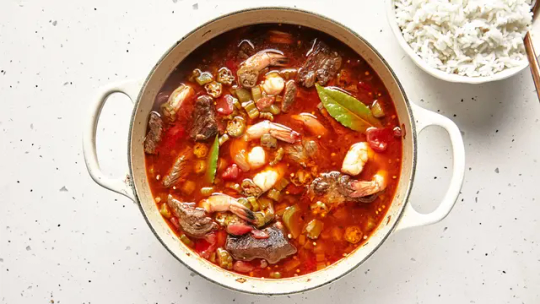
Bahia, Brooklyn, New Orleans, Martha’s Vineyard, and Paris are the places she’s called home. Erudite, wickedly funny, and droll describe her personality. Who are we talking about?
None other than the culinary historian Jessica B. Harris, Ph.D.—founding member of the Southern Foodways Alliance, a member of Les Dames d’Escoffier, a professional society championing women in culinary fields, an award-winning journalist, podcaster, and author of over a dozen deeply researched books and too many articles to count. (If you’re looking for something that goes down like butter, check out her memoir, My Soul Looks Back, filled with tales about her adventures in New York’s Greenwich Village with friends James Baldwin and Maya Angelou.)
As the foremost expert on the foodways of the African diaspora, there’s no better (or wittier) guide to Black culinary traditions. Here, she shares with us a few of the dishes, books, and ingredients she finds essential to unpacking this long, rich, and ever-evolving history. —Dawn Davis, editor in chief

Photo by Suzi Pratt
Try the Homestyle Favorites
Chef Edouardo Jordan’s JuneBaby restaurant in Seattle is an edible praise song to the genius of African American cooks. The menu offers classic dishes like fried chicken and greens along with specials—like chitlins and Momma Jordan’s oxtails—not usually tasted outside of home kitchens.
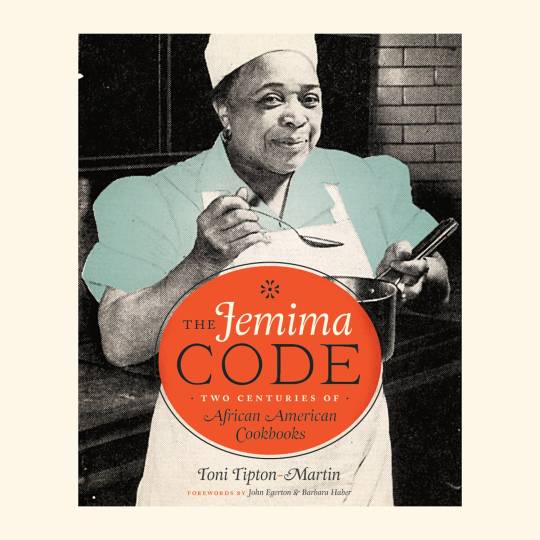
Tour the Archives
Toni Tipton-Martin’s The Jemima Code reclaims and celebrates the heritage of Black America’s controversial “aunt” by documenting 200 years of African American cookbooks from her personal collection. Familiar figures such as Edna Lewis show up alongside unexpected personalities such as activist Bobby Seale and singer Mahalia Jackson in this must-own compendium.
Photo by Emma Fishman
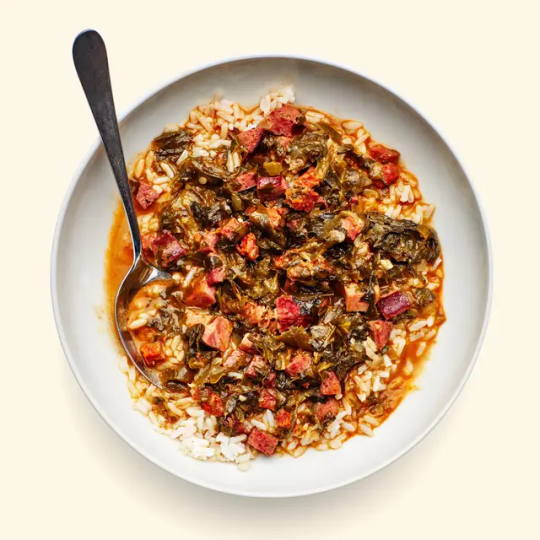
Eat Like an Icon
The late New Orleans chef Leah Chase served Gumbo z’Herbes once a year on Holy Thursday. The dense green meaty gumbo is essential to the rich culinary history of the area’s Creoles de couleur. It’s still served annually at Dooky Chase’s, her iconic family restaurant.
Photo Courtesy Cuisine Noir/Ilaria Sponda
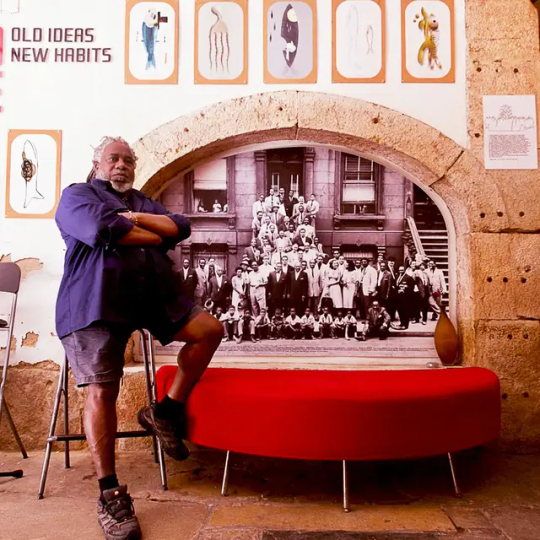
Required Reading
Two invaluable resources for those who want to deepen their knowledge: Black Culinary History and Cuisine Noir. Both websites preserve and promote the past and present contributions of chefs of color throughout the African diaspora.

For The Bucket List
The food of São Salvador da Bahia de Todos os Santos in northeastern Brazil is a linchpin between the food of western Africa and that of the Western Hemisphere. To taste a fish stew called a moqueca or nibble on an acarajé, a street food bean fritter, is to understand the connections.
Photo by Mike Lorrig
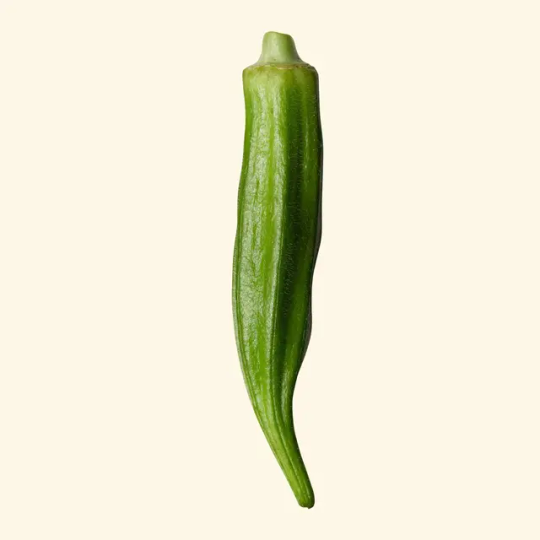
More Okra, Please
Okra, which originated on the African continent, is a love/hate vegetable. Its detractors hate the “slime” and the lovers delight in the way it thickens a soup or stew and its crunch when blanched. Get recipes, history, and gardening tips, in The Whole Okra by Chris Smith.
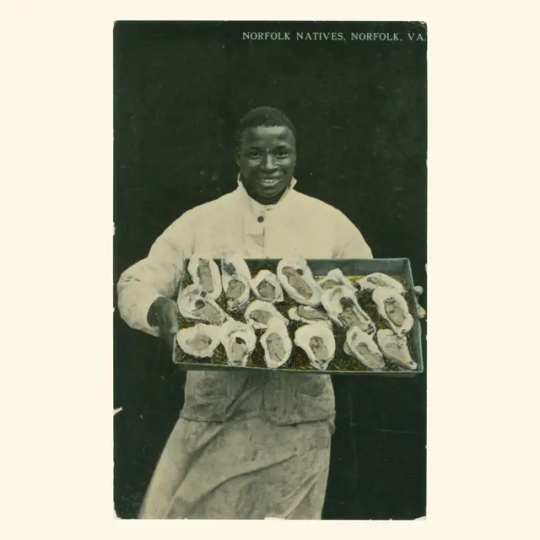
Photo from Vintage Postcards From the African World: In the Dignity of Their Work and the Joy of Their Play by Jessica B Harris,, University Press of Mississippi
Share Knowledge
You can find incredible images of African Americans and food on vintage postcards in my latest book, Vintage Postcards from the African World. They not only present the faces of ancestors but also tell amazing, often harrowing, stories of survival and triumph over adversity.
#Jessica B. Harris's Guide to Black Culinary History#Black Culinarians#Black Cooking#Black Foodies#soul food
2 notes
·
View notes
Link
4 notes
·
View notes
Link
Growing up in an affluent African-American suburb of Los Angeles, Toni Tipton-Martin remembers a childhood filled with fresh fruits and vegetables from her mother’s garden, fried chicken from the local Golden Bird, and taco shells fried from scratch. Now, she fills her own table with everything from tortilla soup to Asian-spiced ribs to Southern biscuits.
All of this to say, she has never connected with the narrow cultural narrative of African-American cuisine.
“My culinary heritage — and the larger story of African-American food that encompasses the middle class and the well-to-do — was lost in a world that confined the black experience to poverty, survival, and soul food,” Tipton-Martin writes in the introduction to her new cookbook, Jubilee: Recipes From Two Centuries of African American Cooking, which was published on November 5.
The book is filled with recipes inspired by or adapted from the nearly four-hundred cookbooks that Tipton-Martin has been studying for the past decade. There are soul food classics like fried chicken and biscuits, but there is also, green bean almondine, lamb curry, and a layered garden salad.
The author sees Jubilee as a second installment to her book, The Jemima Code, a survey of African-American cookbooks and a 2016 James Beard Award winner that almost never happened. “Even though I had a thirty-year food career of some status, I could not get a publisher or literary agent to accept a book about the history and diversity of African-American cuisine,” Tipton-Martin says. “So, I self-published The Jemima Code by creating a blog.”
When The Jemima Code did eventually become a book, she chose to exclude recipes and focus on the historical narrative of African-American cooks. With Jubilee, she includes both, weaving the stories of a diverse group of people — Daisy Redman, a caterer from Savannah in the 1980s; Tom Bullock, a bartender in St. Louis in the early twentieth century; Carla Hall, a modern-day celebrity chef and alumnus of Top Chef and The Chew — with recipes from their cookbooks.
In advance of Tipton-Martin's book event at the Belted Goat in Fearrington Village, the INDY spoke with Tipton-Martin about the challenges of making old recipes relevant to new cooks, how social media has changed the way she thinks about food, and what we can all do to better appreciate the diversity of food and culture in America. Two of Tipton-Martin's recipes from Jubilee are also excerpted.
INDY: Your first book was a James Beard award winner. Did that change anything about your process for writing the second?
TONI TIPTON-MARTIN: We knew all along, when I wrote The Jemima Code, that a recipe book would follow. We intentionally did not include recipes [in The Jemima Code] because we knew that the messaging that African Americans had an alternative history was going to be such a surprise to many people. We thought that adding recipes, and all of the additional explaining of their historical perspectives, would be too big of a message, too much content.
Jubilee took a lot of strategizing, but I think we struck a great balance between history book and cookbook. It’s a total fusion of the two, which is appropriate for a culture that views food as the fusion of so many different cultures and historical experiences, from slavery and poverty, to freedom and affluence.
What were the challenges in making traditional recipes relevant to today’s audience?
One of the interesting challenges is that some of the recipes that would have been considered very elevated at the time, are now considered basic comfort food. For example, the pork chop recipe from the book just got published in the New York Times is going bonkers on social media. In the comments of the pork chop recipe, people are saying, “Oh, I stopped making pork chops, but this is making me want to go make them again!” When that recipe was written, the ham and the chops were the prime cuts for African-American cooks. Now, we think about pork tenderloin or loin as the elite expression of pork consumption, and we’ve forgotten about the chops.
How has social media, and instances like the one you just described, changed the food media landscape and the way you approach food writing?
Social media makes people more open and gives opportunity to people who didn’t used to have it. There are no more gatekeepers to publishing. I created The Jemima Code as a blog because young people kept telling me that I would find an audience. In that way, I could totally identify with the authors profiled in Jubilee, who because of social limitations and racism but not because of their lack of talent, were unable to be published and had to do it themselves.
You’re also an advocate for food access and health equity. How does Jubilee play into that?
There are three parts to my activist mission: culture, cuisine, and community. The recipes showcase traditional African culture and botany. They also demonstrate the culinary prowess of the cooks profiled, their classical training, and their understanding of technique. And, they demonstrate the ways people used food as expressions of community.
If people only take away one thing from Jubilee, what do you hope that is?
My hope is that we are all set free from prejudice, stereotyping, and expectations that a food has to be this or that way. And, that we can appreciate each other for our individuality, and understand that the things that make us all different can be the things that make us alike.
-----------------------------------------------------------
Southern Pecan Pie Laced with Whiskey
Serves 8
You can find standard pecan pie recipes on the label of the corn syrup bottle, [and] through the years I have encountered many inventive variations… But here is the time-honored version — sweet and gooey, packed with nuts — with one twist: The splash of whiskey or rum gives this spirited pie another layer of flavor and takes the pie’s familiar syrupy sweetness down a notch.
1 1⁄2 cups chopped toasted pecans, plus 1⁄2 cup pecan halves
2 tablespoons whiskey or rum
1⁄2 recipe Best-Ever Pie Crust (recipe follows), unbaked
6 tablespoons butter, at room temperature 1 cup packed dark brown sugar
3⁄4 cup dark corn syrup
3 large eggs, beaten
1⁄4 teaspoon salt
1 teaspoon vanilla extract
Place the chopped toasted pecans in a small bowl and toss with the whiskey until coated. Let stand 1 hour.
Preheat the oven to 350°F.
Roll the dough to fit a 9-inch pie plate, and tuck it in as the crust recipe directs.
In a stand mixer fitted with the paddle attachment, cream together the butter and brown sugar until light. Beat in the corn syrup, eggs, salt, and vanilla. Stir in the whiskey-soaked pecans. Pour into the pie shell, and arrange the pecan halves on top in an attractive pattern.
Bake until the filling is set but still has a slight jiggle in the middle, 55 to 60 minutes. (While baking, check to see that the edges of the crust aren’t browning too quickly; cover them with foil if they are.) Cool the pie slightly, then serve warm or at room temperature.
Best-Ever Pie Crust
Makes enough for two 9-inch pie crusts
I use lard for my crusts because I love the rich flavor and short texture, but an all-butter dough results in an even flakier crust, should you choose to substitute more butter for the lard here.
2 cups all-purpose flour, plus more for rolling
1⁄2 teaspoon salt
1 stick (4 ounces) butter, cut into 1⁄2-inch pieces and chilled
1⁄4 cup lard or shortening, cut into 1⁄2-inch pieces and chilled
8 to 10 tablespoons ice-cold water
In a large bowl, whisk together the flour and salt. Sprinkle half of the butter and lard over the flour and use your fingertips, a pastry blender, or two knives to cut and mix until the mixture resembles large peas. Sprinkle in the remaining butter and lard and cut and mix to coarse crumbs. Sprinkle the dough with ice water, 1 tablespoon at a time, and use a fork to lightly mix until the dough just comes together and pulls away from the sides of the bowl.
Gather the dough into a ball. Divide the ball in half. Press into two 1-inch-thick discs and wrap in plastic. Refrigerate for 30 minutes before rolling, or freeze for later use.
Support independent local journalism. Join the INDY Press Club to help us keep fearless watchdog reporting and essential arts and culture coverage viable in the Triangle.
---
2 notes
·
View notes
Text

The Jemima Code
#55#The Jemima Code#Toni Tipton Martin#African americans Cookbooks#Atlanta Fulton Public Library#Black History#food justice#food sovereignty#food access#them and us
0 notes
Text
Cinnamon Rolls!
I read the recipe from the Jubilee cookbook by Toni Tipton-Martin and was hoping it would taste like the biscuit like ones I made in home economics in 7th grade. And lo and behold, that's a yes. This comes together easily using bisquick. As usual, my lazy technique and the humidity worked against me but I'm happy with the results.
Pro tip: I melted the butter for the filling and the icing.

0 notes